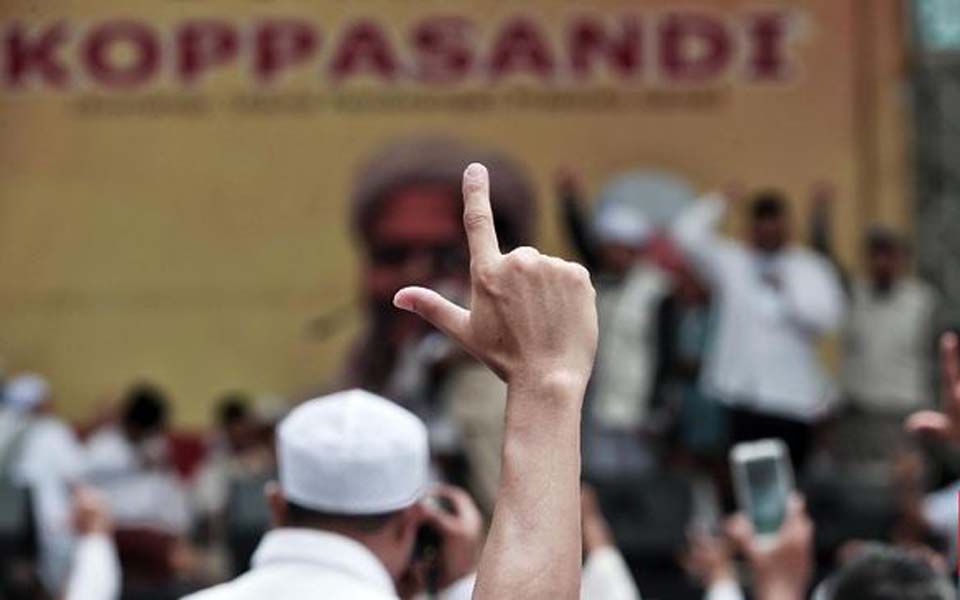Zunita Putri, Jakarta – The Denny JA Indonesian Survey Circle (LSI) predicts that there will be 14 possible contenders for the 2024 presidential election.
Documents containing the term 'LSI'


Jakarta – The results of the latest LSI Denny JA survey show that support for the number 02 ticket in the 2019 presidential elections – Prabowo Subianto and running mate Sandiaga Uno – has increased among voters who want Indonesia to become like the Middle East or Saudi Arabia.

Ihsanuddin, Jakarta – A December 2018 survey by Denny JA Indonesian Survey Circle (LSI) shows that six parties contesting the 2019 legislative elections will not get enough votes to pass the parliamentary threshold of 4 percent required to gain a seat in the House of Representatives (DPR).

Muslimin – A survey by the Denny JA Indonesia Survey Circle (LSI) has concluded that Islamic ormas (mass organisations) are beginning to abandon the Prabowo Subianto and Sandiaga Uno presidential ticket following the 212 Reunion rally in Jakarta on December 2.

Writing on shark reads “Corruption”, writing on boat reads “Public Trust”.
According to a report by the Indonesian Survey Institute (LSI) and Indonesia Corruption Watch (ICW) on its latest study on the public’s perception of corruption, 52 percent of respondents in 2018 agreed that corruption levels have increased in some way.

Jakarta – The latest survey by polling company LSI Denny JA titled Religious Leaders and their Electoral Effect has found that the influence of Islamic Defenders Front (FPI) “Great Leader” Rizieq Shihab has declined significantly as a result of his long stay in Saudi Arabia.

Christie Stefanie, Jakarta – Presidential Chief of Staff Moeldoko says that President Joko “Jokowi” Widodo is still serious about dealing with the problem of human rights in Papua.

Jakarta – The strategic Development and Policy Research Center (Puskaptis) has refused to attend an audit by the Association of Indonesian Public Opinion Surveys Firms (Persepi).
Persepi ethics council member Hamdi Muluk said that the refusal was conveyed directly by Puskaptis executive director Husein Yazid through an SMS message.

Jakarta – The Association of Indonesian Public Opinion Surveys Firms (Persepi) completed its audit of the Strategic and International Studies-Cyrus Network (CSIS-Cyrus), Indikator Politik (Political Indicator), the Indonesian Survey Circle (LSI) and the Saiful Mujani Research Center (SMRC) on the morning of Tuesday July 15.

Jakarta – The political system in Indonesia is controlled by a capitalist oligarchy. This group represents a handful of individuals who use material power to determine political policies and the election of public officials.

Public mistrust in the legal system accompanied by an alarming trend toward street justice appears to be on the rise, with a new LSI survey finding 57% of the public are dissatisfied with law enforcement and the majority believe that the police act unfairly and easily accommodate vested interests.

Hand: Get the job finished...
Arm band reads: Corruption Eradication Commission (KPK). Safe reads: Corruption cases.

President Yudhoyono has received a new blow amid his own declining popularity, with the results of an Indonesian Survey Circle (LSI) survey showing a sharp drop in public approval of his cabinet, dropping from 52.3% in January 2010, and then 46.5% in September 2010, to 37.7% this month.

Jakarta – The number of floating voters is tending to increase. This can be seen not just from the decline in participation levels in elections between 1999 and 2009, but the political parties in general would be unable to hold on to their constituents if an election was held today.

Jakarta – The widespread use of political image projection, including in the recent elections of regional heads, is further driving up the cost of competing in elections. Political costs are being sapped to pay for survey institute services and political consultants. This is the “big harvest” for political consultants.

Surabaya – Coalitions between political parties in the direct election of regional heads in Indonesia are very fluid in character. They tend not to be based on a clear ideological platform, but formed according to narrow pragmatic interests.

Jakarta – The large number of incumbent officials that have been loosing in regional elections is being caused by a number of factors, including the public’s rejection of status quo forces and a desire to vote for new leaders. The preferences for a new face is originating from the floating masses whose numbers are considerable.

... Congratulations to our leaders
the people’s prosperity is ensured...

Jakarta – In the midst of the current decline in the popularity of national leaders, a potential for the emergence of new leaders is opening up.

Jakarta – The support for political parties based upon Islam and with an Islamic mass base is stagnating and tending to decline. The situation is the reverse of political support for parties without a religious basis.




